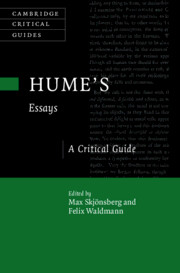Book contents
- Hume’s Essays
- Cambridge Critical Guides
- Hume’s Essays
- Copyright page
- Dedication
- Contents
- Figures
- Contributors
- Acknowledgements
- Abbreviations
- Introduction
- Part I Reception
- Part II Philosophy
- Chapter 4 Hume’s Essays as Philosophy
- Chapter 5 ‘The Sentiments of Sects’
- Chapter 6 Aesthetics and the Arts in Hume’s Essays
- Chapter 7 Religion, Anticlericalism and the Worldly Paths to Happiness in Hume’s Essays
- Part III Politics
- Part IV Political Economy
- Bibliography
- Index
- Cambridge Critical Guides
Chapter 7 - Religion, Anticlericalism and the Worldly Paths to Happiness in Hume’s Essays
from Part II - Philosophy
Published online by Cambridge University Press: 02 January 2025
- Hume’s Essays
- Cambridge Critical Guides
- Hume’s Essays
- Copyright page
- Dedication
- Contents
- Figures
- Contributors
- Acknowledgements
- Abbreviations
- Introduction
- Part I Reception
- Part II Philosophy
- Chapter 4 Hume’s Essays as Philosophy
- Chapter 5 ‘The Sentiments of Sects’
- Chapter 6 Aesthetics and the Arts in Hume’s Essays
- Chapter 7 Religion, Anticlericalism and the Worldly Paths to Happiness in Hume’s Essays
- Part III Politics
- Part IV Political Economy
- Bibliography
- Index
- Cambridge Critical Guides
Summary
Ostensibly, Hume’s Essays do not have much to say about religion. ‘Of Superstition and Enthusiasm’ (1741) may contain an incisive treatment of the psychological origins of religious error and its ecclesiastical and political consequences, but it was the one Essay dedicated to religion published in Hume’s lifetime. But when the topic of religion does come up in the Essays, as it frequently does in examples, asides and footnotes, we find Hume doing two things: outlining the character and dangers of institutional religion on individual happiness and social stability and doing so in a neutral manner characteristic of his wider ‘science of man’. He brought religious belief and priestly power down to the level of another aspect of human life, comparable to the other themes discussed in this guide, and which could subject to ‘scientific’ observation that led to identification of general principles. Piecing together the various discussions of religion, we find Hume articulating a strong anticlericalism in which religion is understood to be a natural propensity of human nature, exploited by priesthoods claiming power over others, but which could be managed through increased scepticism about clerical claims amongst the citizenry and the subordination of church to state.
- Type
- Chapter
- Information
- Hume's EssaysA Critical Guide, pp. 125 - 140Publisher: Cambridge University PressPrint publication year: 2025

